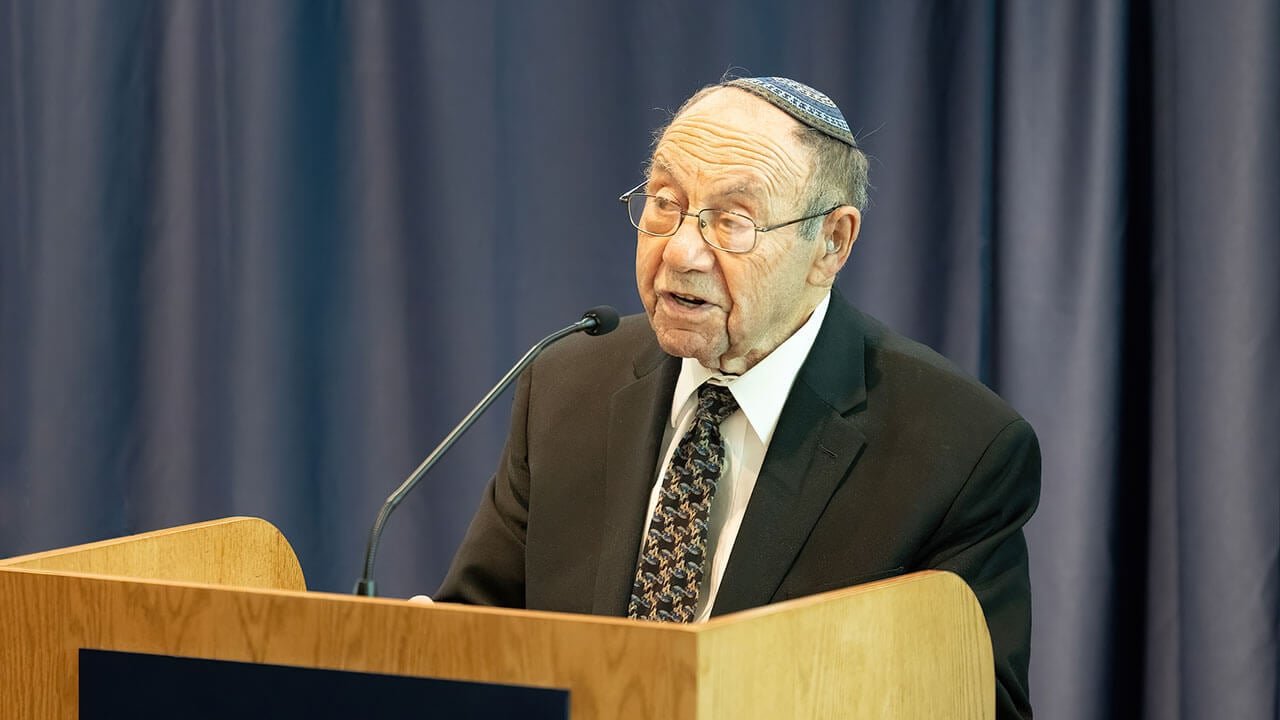
Rabbi’s harrowing tale of survival on Holocaust Remembrance Day is proof that love wins
April 20, 2023

April 20, 2023

Now 92, Lazowski — a pillar of Hartford’s Jewish community who frequently gives talks on college campuses extolling the power of love to combat hate — was the guest of Quinnipiac’s Department of Cultural and Global Engagement on Tuesday, Holocaust Remembrance Day, for a deeply moving discussion entitled, “Forgiveness, Faith and Destiny: Choosing Love.”
After a lighthearted greeting — Lazowski congratulated the audience on the university’s recent triumph in the NCAA men’s ice hockey championship — he began his remarks with a stark reminder.
“We’re living in a time when life has never been more incomprehensible,” Lazowski said. “The whole world has become a huge arsenal of weapons and destruction. Mankind is hopelessly divided by an impenetrable war of terrorism and fear. Crime is on the rise. Hate is on the rise. And antisemitism is on the rise.”
Quoting Winston Churchill, he admonished the audience to know their history before regaling them with the harrowing yet hopeful journey that would form the basis of his memoir, “Faith and Destiny,” the first of over 12 books he’s written.
Education is paramount, Lazowski said, because the erasure of history is a genuine threat to humanity. Telling stories of survival and not sparing any details tamps down prejudice and breathes life into statistics whose impact is lessened with the passage of time.
And his story is particularly powerful.
After sealing off the cave where his mother and father were hiding with his four younger siblings, Lazowski was saved from certain death by a nurse named Miriam Rabinowitz. She agreed to pose as Lazowski’s mother, shielding him alongside her two daughters as Jews of all ages were being massacred.
Lazowski eventually reconnected with his family, but the reunion was short-lived. Sensing the awful fate awaiting the Jews from Bielica when they were rounded up and held captive in a theater, Chaya Gitel pushed her oldest boy from a second-story window — but not before making a plea that would shape a life of servitude.
“I want you to remember three things,” Lazowski recalled his mother telling him. “I want you to survive. I want you to tell the world what is going on here. And I want you to study to be somebody if you can.”
He fled to the woods, eventually reuniting with one of his brothers and their father, who was previously separated from the family when the ghetto where they were living was liquidated. They endured the unimaginably harsh conditions of two Polish winters and wandered around war-torn Europe for two more years before emigrating to Brooklyn, New York, where at 17, Lazowski made good on his promise to his mother to get an education. He graduated from Brooklyn College and the Yeshiva University Rabbinical School.
There were gasps and then applause from the audience as Lazowski — soft-spoken and deliberate — connected the dots of the next chapter in his life. While attending a wedding he learned that Miriam Rabinowitz’s family had settled in nearby Hartford. He was able to reconnect with them and eventually fell in love with one of Miriam’s daughters, Ruth, now his wife of over 60 years with whom he has three sons and seven grandchildren.
It's proof that love can win, even in the face of unspeakable hatred. And it’s a message that resonates across cultural and generational boundaries.
Don C. Sawyer III, vice president for equity, inclusion and leadership development, retraced his own lineage before introducing Lazowski.
“[Rabbi Lazowski’s story] deeply resonates with me and my own family history because my family history also bears some scars of oppression,” Sawyer said. “On one side of my family, I'm a descendant of the Shinnecock people, who suffered massacres and were forced to live on reservations. On the other side, I'm a descendant of enslaved Africans, people who were dehumanized here while building this nation. But despite these troubled histories, I firmly believe in the spirit of humanity and the power of love to overcome all.”
President Judy Olian, herself the daughter of Holocaust survivors, was one of a handful of audience members to ask poignant questions of the rabbi during the Q&A portion of the event. Among the questions was whether he can summon any compassion for the Nazis.
“I forgive people for what they did wrong — if they acknowledge the fact that they are guilty,” Lazowski said. “Most of the Nazis lied and said they never did anything. As a human being, not as a rabbi, I was taught to forgive people. But sometimes these people have to pay for their brutality.”
Lazowski closed his remarks by echoing his mother’s words.
“Study hard and you will make a better world,” he told the students in the crowd. “You must get good marks. And to get good marks, you have to study. Bless you all.”
A $500 FAFSA Incentive Grant will be applied to the financial aid offer of admitted first-year students who complete the FAFSA by January 15, 2025.
Quinnipiac Today is your source for what's happening throughout #BobcatNation. Sign up for our weekly email newsletter to be among the first to know about news, events and members of our Bobcat family who are making a positive difference in our world.
Sign Up Now